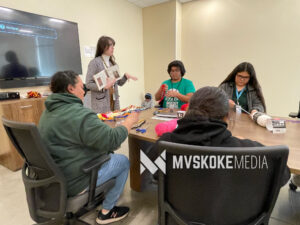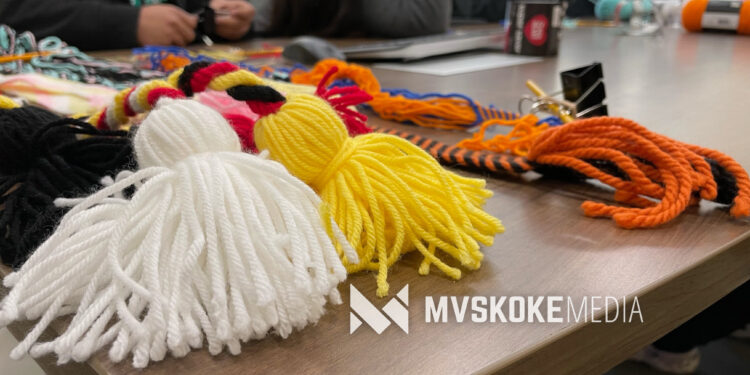OKMULGEE, Oklahoma – One of the many traditions of Mvskoke culture is the unique crafts made by the Mvskoke people, passed down from generation to generation. Those traditions continue to be passed down through the Connect the Disconnect cultural art class series.
The series is a collaboration between Muscogee (Creek) Nation Youth Services and Behavioral Health. This month’s classes included finger and basket weaving.
Eli Rowland is the Language Revitalization Manager with the MCN Language Department. Her job involves working closely with surrounding public schools to implement the Mvskoke language into the curriculum. For her, these cultural classes are special because it connects her with the tribe and allows her to pass on what she has learned.
“I felt pretty disconnected, and I’ve always been very art-oriented,” Rowland said. “Anytime that I heard that a master was teaching a class, I would be like, ‘can I go learn that so we can teach it?'”
One of those masters includes longtime Mvskoke artist Sandy Fife Wilson. Rowland was first introduced to the colorful world of finger weaving from a class taught by Wilson at the Council Oak House. After successfully weaving her first belt, Wilson was hooked.
“It felt so good because when you first start finger weaving, it looks like you’re doing it wrong,” Rowland said. “I was worried that I was messing it up, but I kept going, and you start to actually see the pattern.”

Rowland began to weave her own patterns and started a practice of teaching classes entwining culture and community through extracurricular courses.
Rowland makes her traditional clothing, including ribbon skirts, vests, and dresses. She also makes accessories, including moccasins, collars, bracelets, necklaces, and pendants. Outside of attire, her craft knowledge extends to weaponry like blowguns, darts, and corn husk dolls.
Jasmyne Jack is a youth counselor advisor with MCN Youth Services. She has seen the Connect the Disconnect series evolve over the past few years. According to Jack, the program initially began pre-pandemic but temporarily went entirely virtual. However, it is now back in person with a limited capacity.
“We want to ensure the youth are doing something positive,” Jack said. “We do believe culture is prevention. This is also a good tool to get the parents involved and family members that can teach them.”
Sometimes students do not always finish their projects during class. They take home what they make, and it is up to them to finish it. Jack shared that the most rewarding part about the program is seeing students send in pictures of the projects they completed on their own.
These classes have had huge impacts on former students. According to Rowland, she has even had some former students reach a skill level where they are confident in selling their ribbon skirts, supporting themselves through college while doing so.
While the classes serve an essential purpose in providing students with constructive activity, it also holds a dual purpose in passing down the Mvskoke traditions.
“It felt like you could see something preserved in the culture when you looked at their stuff,” Rowland said. “I wanted to be able to do that.”
The Connect the Disconnect series will continue bimonthly throughout the year. February’s classes will focus on beading. Classes are in person, masks are encouraged, and they are open to Native youth ages 12-24. The course is free to participate. However, pre-registration is required. Those who wish to register for a cultural art class can visit their website, mvskokeyouth.com/event-registration.





